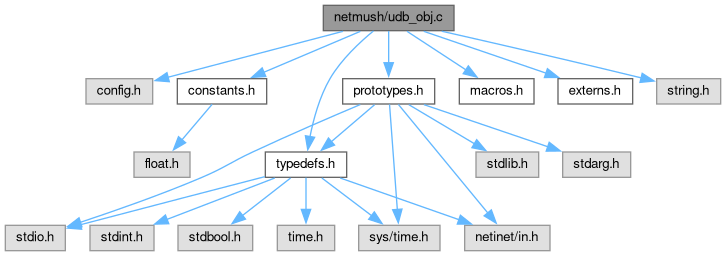Binary object handling gear. More...
#include "config.h"#include "constants.h"#include "typedefs.h"#include "macros.h"#include "externs.h"#include "prototypes.h"#include <string.h>
Include dependency graph for udb_obj.c:

Functions | |
| UDB_OBJECT * | unroll_obj (char *data) |
| char * | rollup_obj (UDB_OBJECT *o) |
| int | obj_siz (UDB_OBJECT *o) |
| void | objfree (UDB_OBJECT *o) |
| char * | obj_get_attrib (int anam, UDB_OBJECT *obj) |
| void | obj_set_attrib (int anam, UDB_OBJECT *obj, char *value) |
| void | obj_del_attrib (int anam, UDB_OBJECT *obj) |
| UDB_OBJECT * | get_free_objpipe (unsigned int obj) |
| char * | pipe_get_attrib (int anum, unsigned int obj) |
| void | pipe_set_attrib (int anum, unsigned int obj, char *value) |
| void | pipe_del_attrib (int anum, unsigned int obj) |
| void | attrib_sync (void) |
Detailed Description
Binary object handling gear.
- Version
- 3.3
- Date
- 2021-01-04
- Copyright
- Copyright (C) 1989-2021 TinyMUSH development team. You may distribute under the terms the Artistic License, as specified in the COPYING file.
- Note
- Why not just write the attributes individually to disk? Well, when you're running on a platform that does synchronous writes with a large database, thousands of I/O operations tend to be expensive. When you 'coalesce' many attribute writes onto a single object and do only one I/O operation, you can get an order of magnitude speed difference, especially on loading/unloading to flatfile. It also has the side effect of pre-fetching on reads, since you often have sequential attribute reads off of the same object.
Wile all of this is extremely true, keep in mind that text was written over 25 years ago. Even if we didn't optimized our read/write sequence you woudn't see the difference.
If you really want to see the difference, it's time to get youself into the retro-computing scene :)